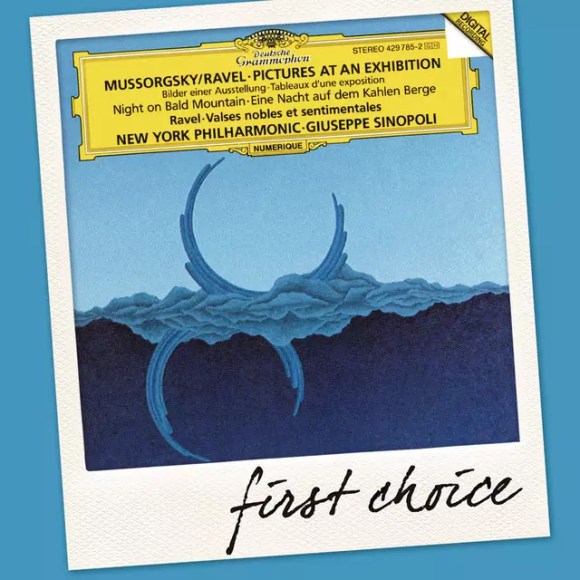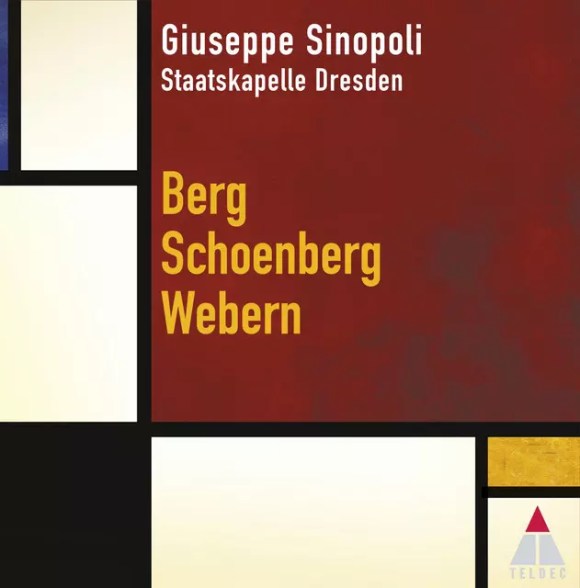
Bruckner Symphonien
- Bruckner: Symphonies Nos. 3-5, 7-9
- Giuseppe Sinopoli (conductor), Staatskapelle Dresden
- Recorded 1987-1999
- Deutsche Grammophon/Tower Records Vintage Collection PROC-1182/7 (6 CDs)
Mahler’s symphonies were all characteristically different from each other, much like Beethoven’s. With Bruckner, however, the story is quite the opposite. Bruckner’s basic musical language is monolithic; underlying the superficial differences between his symphonies is pretty much an identical structural, sonoric and harmonic template.
Sinopoli clearly understands this. In his Bruckner, consistency is the watchword. There are none of the interventionist antics that we sometimes find in his Mahler; all of these performances unfold with uncommon elegance and simplicity. Instrumental sections are beautifully balanced; phrases are organically shaped. Of course, Bruckner is no stranger to the Staatskapelle Dresden, having performed and recorded this music under Böhm, Jochum and Blomstedt. Their luminous, transparent sound brings a welcome lightness to the music, in contrast to the monumental weight that we often hear in other Bruckner performances.
For all this naturalness, though, there’s a certain lack of inspiration from the podium. For instance, in the 4th, the rapturous brass chorale in the development of the first movement falls flat, while the Adagio of the 9th has not the apocalyptic vision so vivid under Celibidache (though to be fair, few do). However, the best performances in this incomplete cycle, the 5th and 8th, are imbued with Sinopoli’s trademark intensity, and the sonics are extremely fine. Overall, then, this is a good, but not great, Bruckner cycle.

Verdict
Worth hearing more for the Staatskapelle Dresden’s glorious playing than for any insight from the podium, Sinopoli’s Bruckner is decent but not essential.

Mussorgsky: Pictures at an Exhibition (orch. Ravel); Night on Bald Mountain; Ravel: Valses nobles et sentimentales
- Giuseppe Sinopoli (conductor), New York Philharmonic
- Recorded 1989
- Deutsche Grammophon 479 0367
Sinopoli had a fruitful guest conducting and recording relationship with the New York Philharmonic, with discs of among other things Wagner, Strauss, Respighi, and Scriabin. This is arguably the best of the lot. Sinopoli sees the music for what it is — no more, but critically no less, than colourful orchestral showpieces — and allows the orchestra’s considerable virtuosity to shine through. Thanks to New York’s Herculean brass section, the terror in Night on Bald Mountain and the Catacombs from Pictures is rendered astonishingly vividly, while in the Ravel there is a lightness of touch and a most beguiling stylishness. The Mussorgsky, though, is the outstanding performance here, and it joins Abbado/LSO, Gergiev/Vienna, and Ancerl/Czech PO in the top echelon of the greatest recordings of this oft-performed work.

Verdict
Astoundingly played, intelligently conducted, beautifully recorded; an indispensable disc of two repertoire warhorses.


Strauss: Eine Alpensinfonie
- Giuseppe Sinopoli (conductor), Staatskapelle Dresden
- Recorded 1993
- Deutsche Grammophon 439 899-2 (1CD)
Strauss: Josephs Legende
- Giuseppe Sinopoli (conductor), Staatskapelle Dresden
- Recorded 1999
- Deutsche Grammophon 463 493-2 (1CD)
Strauss was one of Sinopoli’s specialities. He undoubtedly identified with Strauss’ late romantic idiom — the decadent harmonies, lush textures and colourful orchestration. Selected here are two of his best Strauss recordings.
The Alpine Symphony was recorded during the Staatskapelle Dresden’s traditional Palm Sunday concert in April 1993. The orchestra has a special authority in this music; it gave the premiere in 1915 with the composer conducting and has recorded it many times since. Sinopoli moves things along smartly, threading the various scenes together in a compelling narrative, and revels in the orchestra’s idiomatic, full-throated playing. Starting off with a spectacular sunrise, the ensuing ascent and pastoral scenes are as picturesque as one could ask for, and the performance hits its stride in a harrowing, graphic storm. Pity that the Summit and Vision sections lack the sense of transcendence and culmination as the greatest performances (e.g., Asahina) do. The recorded sound is vivid but a bit recessed, probably due to the presence of the audience, and the Wagner tuba lines tend to get drowned out in the welter of sound.
No such qualms are present in this breathtaking performance of the rarely-performed Josephs Legende, a hour-long ballet dating from around the same period as the Alpine Symphony. It’s not a piece that withstands frequent repeated listening, such is its length and its tendency to ramble, but it’s worth listening to, if only just to wallow in its in voluptuous textures and brilliant colours. Sinopoli luxuriates in the fin-de-siècle decadence of the music, while the orchestra provides playing of exceptional sumptuousness and virtuosity, particularly in the perilously high tessitura of the brass writing. The recording itself is of audiophile quality, full of brilliance, presence and clarity.

Verdict
These two recordings, particularly the Josephs Legende, display Sinopoli’s worthy credentials as a premier Straussian.

Berg; Schoenberg; Webern
- Giuseppe Sinopoli (conductor), Staatskapelle Dresden
- Recorded 1995-1998
- Teldec 2564 69414-0 (or 2019 reissue: Warner 0190295439576)
Sinopoli’s intimate knowledge of the Second Viennese School and the presence of the Staatskapelle Dresden makes this set almost self-recommending. Unlike other conductors with a modernistic bent (chief of whom is, of course, Boulez), there’s nothing clinical or dispassionate about these performances; Sinopoli again invests his distinctive fusion of intellect, passion and stylishness, making these mostly gnarly works sound accessible, beautiful, and even fun(!). There are no weak performances at all in the set, and many count as some of the best available.
For instance, this performance of Schoenberg’s Chamber Symphony No. 1 is the one that I return to most often; Sinopoli brings into high relief the quartal harmony theme and its various transformations throughout the work. The Berg Orchestral Pieces (Op. 6) are masterfully presented, and the March culminates in a wonderfully chaotic climax, with earsplitting hammer blows. Best of all is this passionate, vibrant and refreshingly transparent Gurrelieder that belies the vast forces involved. The Song of the Wood-Dove (Lied der Waldtaube) is ardently delivered by Jennifer Larmore, and the ensuing Part II in which Waldemar curses God for allowing his sweetheart Tove to die is intense and blood-curdling. And when the 400-strong orchestra and chorus gather forces in the grand denouement, Sinopoli lets them rip, generating an overwhelming wall of sound. Though I have individual preferences here and there (Perlman/Ozawa and Szeryng/Kubelik in the Berg Violin Concerto, Boulez/Ensemble InterContemporain in Pierrot Lunaire), but all the performances here are of extremely high quality, and the Staatskapelle Dresden’s playing is beyond reproach.
The recording itself deserves special mention. Not only do they sound incredibly natural and impactful, they also sound very consistent throughout all the recordings, regardless of the varying size of the orchestral forces. This set, then, represents a considerable achievement, and if I were to recommend a single set of recordings of the music of the Second Viennese School, this would undoubtedly be it.

Verdict
An essential collection of Second Viennese School works; 8 CDs of consistently marvellous conducting, playing and recording.

Verdi: Requiem
- Daniela Dessi (soprano), Elisabetta Fiorillo (mezzo soprano), Johan Botha (tenor), Roberto Scandiuzzi (bass), Giuseppe Sinopoli (conductor), Staatskapelle Dresden
- Private label (2CD)
- Recorded 2001
On the 13th and 14th of February 2001, Sinopoli set down this recording of Verdi’s Requiem, which turned out to be his very last. Not that he would ever have expected it, but in many ways, it brings a fitting and satisfying conclusion to his conductorial career.
Few works in the classical music repertoire have been attached with such dichotomous interpretative norms as Verdi’s Requiem, namely the reverential/spiritual (e.g., Giulini’s late recordings, Celibidache), and the operatic/dramatic (e.g., Giulini’s early recordings, Muti). This dichotomy traces its origins to Hans von Bülow’s famous remark that it was an “opera in ecclesiastical robes”, and has since stubbornly persisted in the schema of the collective musical consciousness.
Sinopoli’s interpretation perfectly illustrates the dangers of rigid characterization. Yes, it is perhaps more dramatic than it is spiritual: here is Sinopoli the fellow Italian, Sinopoli the opera conductor, Sinopoli the dramatist, raising the roof in the Dies Irae, coaxing some beautiful rubato phrasing out of the singers and orchestra, and rounding off the work with a cataclysmic Libera Me (sound clip).
Yet we also hear Sinopoli the thinker, Sinopoli the analyst, Sinopoli the philosopher. Rather than simply presenting the work as a concertante for vocal quartet, he wisely treats the orchestra with equal care and attention-to-detail as the soloists; he clearly delineates the different instrumental lines in the fugal episodes in the Libera Me and Sanctus, and finds some wonderfully poetic countermelodies often buried in other recordings (e.g., the scrupulous clarinet detailing in the Liber Scriptus).
Such is the overwhelming strength of Sinopoli’s guiding intelligence that it is easy to take for granted other pertinent musical matters, such as the exceptional playing and singing (both choral and solo) and the excellent recording. Really, I cannot think of a better summation of Sinopoli’s style than this performance: passionate, sensitive, intelligent, a magnetic interpretation.

Verdict
One of the great Verdi Requiems, Sinopoli’s last recording is the perfect amalgamation of the heart and mind, and a fitting tribute to his musical genius.
